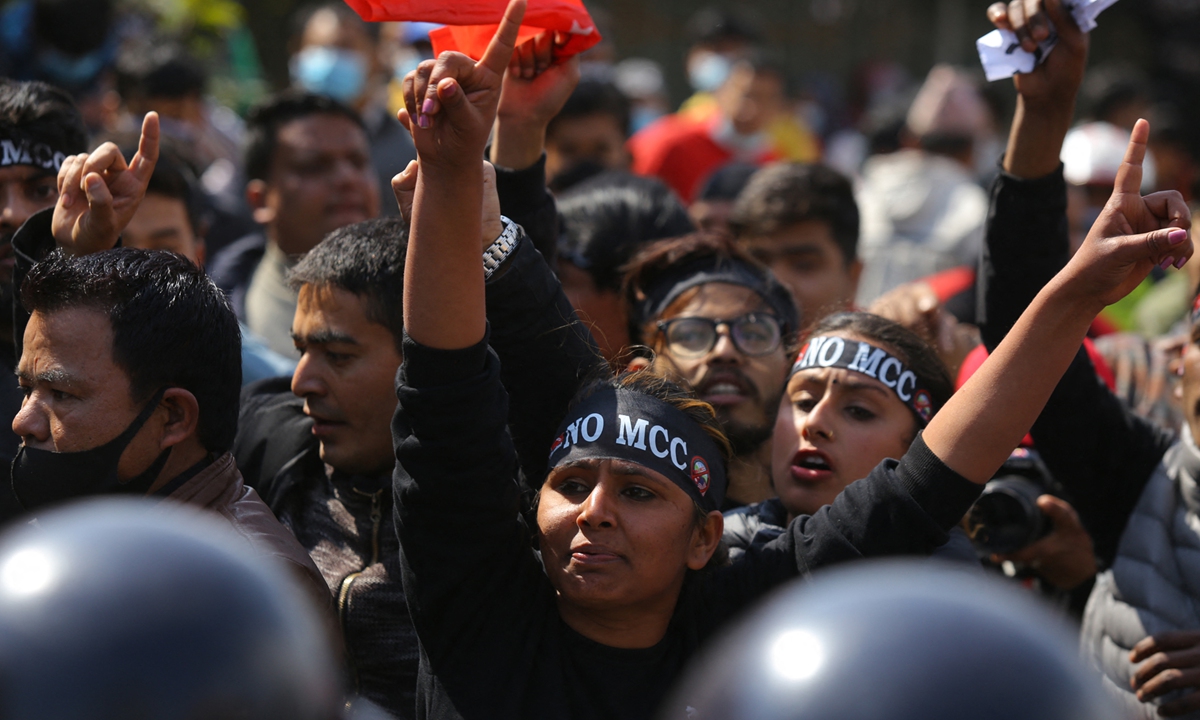
Nepalese protest against the MCC in Kathmandu, Nepal on February 20, 2022. Photo: AFP
Nepal's Parliament approved a $500 million US government grant on Sunday. According to the Millennium Challenge Corporation (MCC) pact Nepal signed with the US in 2017, the funds will be used in some electricity transmission line and road improvement projects and does not need to be repaid.
But there is no such thing as a free lunch, especially from the US. The seemingly generous aid pact contains provisions that seriously infringe upon Nepal's sovereignty and national interests. If the MCC pact is purely an aid agreement, then why does it include provisions stipulating that the MCC agreement "will prevail over the domestic laws of Nepal" and that MCC staff are immune from "all courts and tribunals of Nepal"?
While Nepal's coalition government issued an "interpretive declaration" claiming that Nepal will not become part of any strategic, military or security alliance "including the Indo-Pacific Strategy" of the US, observers pointed out that the declaration, which was made in response to public concern, is not included in the MCC pact. In the event of a conflict between the two documents, it seems evident which one will prevail.
Clearly, despite the guise of economic assistance, the MCC pact is actually a colonialist tool by the US in an attempt to make Nepal its new geopolitical pawn in pursuing Washington's so-called Indo-Pacific Strategy.
For years, some Western powers, led by the US, have been trying to instigate hostility to undermine the relationship between China and Nepal. The latest development with the MCC pact will certainly serve as another step forward in that direction. In this sense, the ratification of the MCC pact between the US and Nepal doesn't necessarily mean that Nepal will be on a fast track for social development, but it does mean that the South Asian nation will face more risks of becoming a front of potential geopolitical tensions.
In fact, this is what many in Nepal are now concerned about - the prospect that the US may employ various diplomatic and military coercive measures to force Nepal to join the US-led ill-intentioned security camp in the name of assisting its development.
China always supports developed countries to increase their aid to developing countries like Nepal. But if the aid is intended to increase the US' military presence in South Asia, or is tied to other forms of political coercion for its geopolitical goals, China firmly opposes it. China has maintained that international development cooperation projects should be carried out on the basis of mutual respect and equality, which is the principle China has always upheld in cooperation under the Belt and Road Initiative over the years. It is true that some developing countries are in dire need of infrastructure aid, but this must not be the opportunity for the US and its Western allies to take advantage of these nations, conduct coercive diplomacy and undermine other countries' sovereignty and interests for selfish gains.
China has also participated in several infrastructure projects in Nepal, and it remains uncertain whether the MCC will undermine China-Nepal cooperation in the future. If the US wants to build a US-dominated infrastructure network in Nepal under the MCC by excluding the participation of other countries like China, it would cause a split in regional cooperation. This may be in the interest of the US, but will definitely hurt Nepal's interests.
As the world pays close attention to the ongoing Russia-Ukraine conflict, in which the US has been playing a major role of inciting tension and hatred, it is necessary for South Asia to be vigilant against the so-called US aid that could do nothing but instigate regional tension and threaten regional peace and development.




